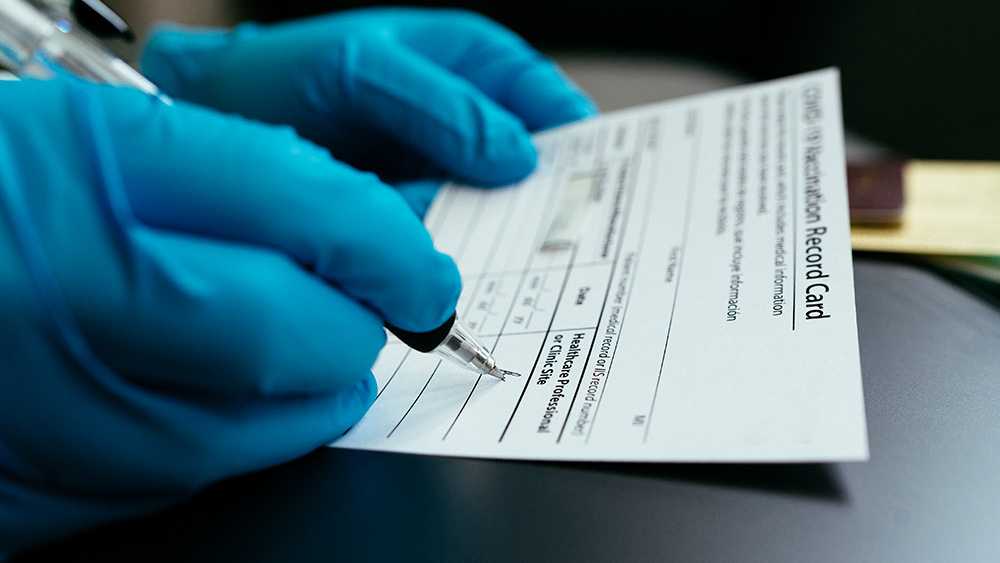STUDY: COVID-19 vaccines linked to unexpected bleeding in women
10/05/2023 / By Zoey Sky

Research has linked the Wuhan coronavirus (COVID-19) vaccines to many adverse effects, from minor health issues to severe injuries and even death.
A recent study is now adding more to existing evidence by revealing that COVID-19 vaccines may also be linked to bleeding in women who don’t menstruate, such as postmenopausal women and those on contraceptives. These women were found to be “several times more likely to experience unexpected vaginal bleeding after COVID-19 vaccination than before the vaccines were offered.”
The study was published in the journal Science Advances.
When COVID-19 vaccines were rolled out globally, many women reported heavier-than-usual menstrual bleeding after vaccination.
Kristine Blix, one of the study authors from the Norwegian Institute of Public Health in Oslo, set out to research the trend systematically, especially in women who don’t normally have periods.
While Blix and her team did not look into the reasons for the unexplained bleeding, their findings suggest that it could be linked to the SARS-CoV-2 spike protein used in the vaccines. Big Pharma claims that the COVID-19 vaccines are “safe and effective,” but studies like Blix and her team’s beg to differ.
Blix and her fellow researchers analyzed an ongoing population health survey called the “Norwegian Mother, Father and Child Cohort Study.” According to Blix, the research team had access to biweekly questionnaires sent to the study participants to monitor the effects of the pandemic since the early days of the pandemic.
In the first questionnaire that covered COVID-19 vaccinations sent in 2021, several female participants reported in free-text fields that they had experienced heavy menstrual bleeding. This prompted the researchers to look for “bleeding patterns in a structured manner.” (Related: Pfizer data reveals COVID-19 vaccines were NEVER safe for pregnant women.)
COVID-19 vaccination triggers unexpected vaginal bleeding
The researchers analyzed more than 21,000 responses from postmenopausal, perimenopausal and non-menstruating premenopausal women. The participants included some women who were on long-term hormonal contraceptives.
Blix said that the results were “surprising.” Data showed that 252 postmenopausal women, 1,008 perimenopausal women and 924 premenopausal women reported experiencing unexpected vaginal bleeding.
At least 50 percent of each group reported that the bleeding occurred four weeks after their first or second COVID-19 vaccine dose or both.
The questionnaires also revealed that premenopausal and perimenopausal women were most likely to report unexpected bleeding in the month after getting the vaccine, with their risk being three to five times as high as before vaccination. The risk for postmenopausal women increased by as much as two- to threefold.
During the pandemic, Norway distributed the Moderna and Pfizer-BioNTech mRNA vaccines, as well as the AstraZeneca vaccine. In October 2022, the European Medicines Agency updated the side effect information of mRNA vaccines to include heavy menstrual bleeding.
Unexpected bleeding after menopause is often considered medically serious, especially since it could be an early sign of conditions like endometrial carcinoma and precancerous lesions.
While it is not completely clear whether the post-vaccination bleeding is a side effect of the COVID-19 vaccines, physicians can take this into account when evaluating a patient’s condition.
Kate Clancy, a biological anthropologist at the University of Illinois Urbana-Champaign, warned that postmenopausal bleeding is “often very concerning and a possible sign of cancer.” She added that knowing a patient’s vaccination status could help “put their bleeding incidence into context.”
Clancy’s group published the results of their own survey showing changes in menstrual bleeding after COVID-19 vaccination. She added that the results align with her team’s findings and could help to inform patients and clinicians.
Blix said that the most important contribution of this and other documentation will be that “female bleeding patterns are included as end points, or monitored, in clinical trials of new vaccines — and perhaps even drug trials.”
Clancy is glad that there is another group studying peri- and postmenopausal people because it is important to “see more attention on a very underserved group.”
Pandemic stress can also affect periods
Sometimes, stress can affect a woman’s period. If you’re someone with a regular period, even some slight differences are noticeable.
There’s no denying that the COVID-19 pandemic and other distressing developments in recent history qualify as a major form of stress. The pandemic has resulted in different kinds of intense personal challenges that can often disrupt lives, such as losing a loved one.
As the study above has proven, women who menstruate could experience disruptions, from skipped periods to changes in bleeding patterns.
Dr. Taraneh Shirazian, the director of global women’s health and an assistant professor of obstetrics and gynecology at NYU Langone Health in New York City, explained that what health experts can say about COVID-19 and its effects on the menstrual cycle is comparable to what they can say about other viral infections and prolonged periods of stress: Menstrual disruptions are likely to occur.
Shirazian added that when you are infected with COVID-19, it’s a stress on the body and a major stress on the hypothalamic pituitary adrenal (HPA) axis, the body’s central stress response system.
During times of stress, the HPA axis stimulates the release of cortisol, the stress hormone, to help your body prepare to fight or flee from a threat.
With ongoing stress, increased cortisol levels can affect your menstrual cycles. Additionally, with prolonged periods of stress, the stress response system can burn out, and the HPA axis can be suppressed. This could drive down the pituitary production of follicle-stimulating and luteinizing hormones (FSH and LH), which, in turn, drive down ovarian production of estrogen and progesterone.
With complete suppression of the HPA axis, a woman may experience amenorrhea or the absence of periods. With partial suppression, a woman may experience spotty periods or periods of bleeding every few weeks.
While there isn’t one clear pattern, women respond differently to suppression of the HPA axis, noted Shirazian.
Find more stories about the adverse effects of COVID vaccines at VaccineInjuryNews.com.
Watch the video below to learn how Pfizer knew that the COVID-19 vaccine would harm women and their unborn children.
This video is from the Worldview Report channel on Brighteon.com.
More related stories:
Australia quietly drops approval for AstraZeneca COVID-19 vaccine.
Australian Senate grills Pfizer, Moderna reps about covid “vaccine” genocide.
Top 7 ways COVID-19-VACCINE DAMAGE is being covered up by the vaccine industrial complex.
Sources include:
Submit a correction >>
Tagged Under:
Big Pharma, biological weapons, bleeding, covid-19, health science, pandemic, Pfizer, pharmaceutical fraud, real investigations, research, spike protein, truth, vaccine damage, vaccine injury, vaccine wars, vaccines, women's health
This article may contain statements that reflect the opinion of the author
RECENT NEWS & ARTICLES
COPYRIGHT © 2017 IMMUNIZATION NEWS




















